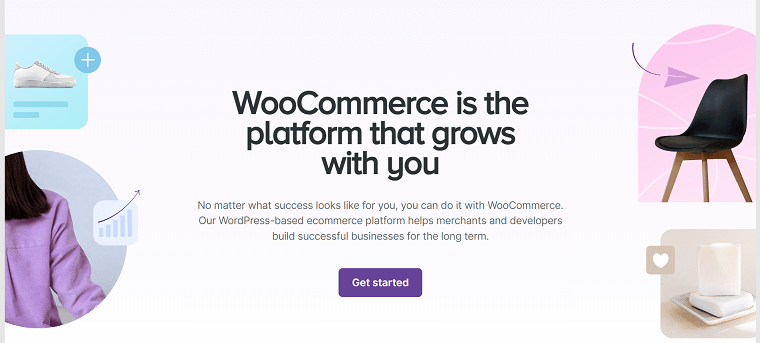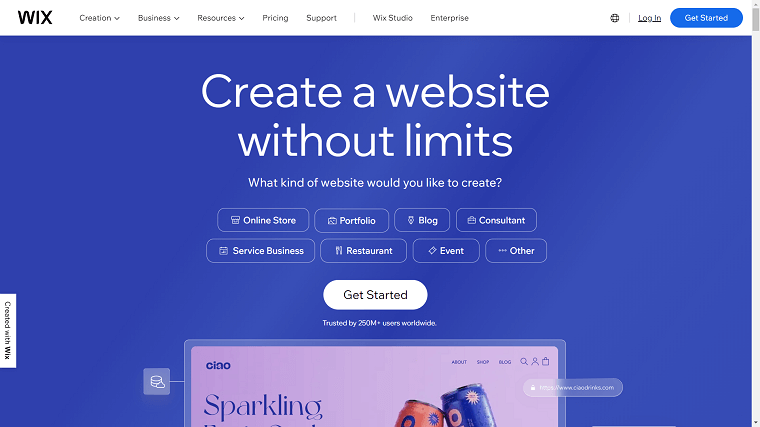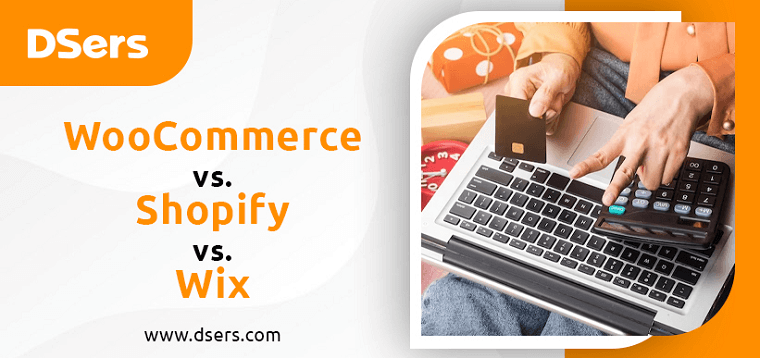How to Pick the Best E-commerce Platforms: Shopify vs. WooCommerce vs. Wix

Establishing an online shop has become essential for businesses in today's modern world. Fortunately, numerous options are available for operating on the World Wide Web. Among the popular choices for small businesses are Shopify, WordPress’s WooCommerce, and Wix. But which e-commerce platform best fits your new e-commerce venture or transitioning your existing shop online? This article compares WooCommerce, Shopify, and Wix to help you make an informed decision.
What Is Shopify

Shopify is a comprehensive e-commerce platform that empowers businesses of all sizes to establish online storefronts and sell their products seamlessly. Here are the key features:
- Unified Control Panel: You can set up your store using a single, integrated control panel with Shopify. This streamlines the process and ensures consistency across your sales channels.
- Diverse Sales Channels: Sell not only on your website but also across social media platforms, seller marketplaces, blogs, and other websites. You can even reach customers via email, text, and chat.
- Integrated Point of Sale (POS): Shopify’s POS system simplifies in-person selling at retail stores, pop-up shops, farmers’ markets, and various venues. Manage everything from one interface.
- Efficient Inventory Management: Keep track of your inventory, customer data, and administrative tasks within Shopify. It’s all linked, making your operations more efficient.
- Exploring New Markets: Once you’ve mastered the basics, Shopify enables you to expand into untapped markets and explore unconventional selling methods.
What Is WooCommerce

WooCommerce is a powerful and flexible e-commerce plugin specifically designed for WordPress websites. It empowers users to create virtual stores with ease. Here are the critical points about WooCommerce:
- User-Friendly Interface: WooCommerce simplifies the process of managing online shops. Creating product pages, handling customer orders, or integrating payment gateways provides an intuitive experience.
- Availability: The WooCommerce plugin is available for download from the WordPress plugin directory. You can seamlessly add it to your existing WordPress site.
- No Coding Required: Unlike complex programming, WooCommerce allows beginners to dive in without being computer scientists or expert programmers. Many companies choose it for its accessibility.
- Impressive Adoption: Currently, 3.8 million online stores utilize WooCommerce—from department stores to cozy bed and breakfasts to charitable organizations.
- Origins: WooThemes, the company behind WooCommerce, introduced the platform in 2011. Later, in 2015, Automattic, the force behind WordPress, acquired WooThemes.
- Game-Changing Integration: The seamless integration of WordPress and WooCommerce transformed the e-commerce landscape. Automattic continues to contribute actively to WooCommerce and its add-ons.
What Is Wix

Wix, a versatile website builder, launched Wix—a dedicated version for online stores, brands, and merchants of all sizes—on June 30, 2020. With this release, Wix significantly strived to align with the booming e-commerce market trend.
Here are some key features of Wix:
- Advanced Capabilities: Wix e-commerce brings cutting-edge tools to the table. These include robust business and financial management features, streamlined customer shopping experiences, and efficient payment processes.
- Business-Friendly: Whether a small boutique or a large-scale brand, Wix e-commerce caters to your needs. Manage your inventory, engage customers, and handle transactions seamlessly.
- Customizable Shopping Cart: Create a unique shopping experience for your customers with Wix’s customizable shopping cart and express checkout.
- Secure Transactions: Protect your Wix store and customers’s security with a free 256-bit SSL certificate. All site content, personal information, and payments are secured through advanced encryption.
- Global Reach: Translate your store into 90+ languages using Wix Multilingual. Optimize translated sites for SEO and adapt to an international audience.
Shopify vs. WooCommercey vs. Wix: A User-Friendly Comparison

1. Ease of Use
As an entrepreneur, your time is gold. Most of it should be spent engaging with customers, shipping products, and liaising with suppliers. For this, a hassle-free and easy-to-maintain online store platform is your ally, allowing you to focus on growing your business.
Shopify
Shopify is the epitome of user-friendliness. It's designed for those who might need to be more tech-savvy but are eager to launch their online store without fuss. While Shopify's backend packs a punch, its beautifully simple editor means you won't be pulling your hair out trying to get things done. Technically, the platform is worry-free, supported by comprehensive guides that could see you launching your store in just a week.
WooCommerce
Integrating WooCommerce with your WordPress site transforms your dashboard into a powerhouse for managing inventory, orders, promotions, and more. Adding products or tweaking your store's design is just a few clicks away. However, it's worth noting that WooCommerce, as a WordPress plugin, demands some WordPress knowledge to shine genuinely. Setting up both WordPress and WooCommerce requires more elbow grease, including some basic coding skills to get off the ground.
Wix
Wix is another friend to the technically timid. This cloud-based platform prides itself on being more straightforward than its open-source rivals. Wix's superpower lies in its drag-and-drop interface, making store creation as easy as pie. Building on the user-friendly nature of its parent platform, Wix e-commerce introduces nifty features like Wix Multilingual, Wix ADI, and the Wix Editor, making it a joy for budding entrepreneurs.
Each platform offers a unique blend of simplicity and functionality, but the right choice depends on your comfort level with technology and how much time you're willing to invest in setting up and managing your online store.
2. Crafting Your Online Storefront
Diving into the world of online shops, you'll find that the chic themes offered by WooCommerce, Wix, and Shopify can make your store shine with a professional vibe. Yet, each of these platforms brings flavor to the table regarding customization and ease of use. Let’s peel back the layers of these differences.
Shopify
Now, Shopify struts in with a wardrobe of over 70 stylish free and premium themes. Thanks to its e-commerce-first approach, each theme is tailored not just to look good but to boost your sales, too. How about splurging on a premium theme starting at $140? See it as decking out your store for success, an investment that keeps giving. And for those watching the purse strings, there’s no shortage of free options to get started.

|
Manage Multiple Stores In One Account Multiple Stores Management - Link and manage multiple stores on different platforms in one place |
WooCommerce
Imagine dressing up your online store just the way you like it. That's what WooCommerce, with its flagship theme Storefront, offers. It’s not only mobile-responsive, adapting seamlessly to any device, but also boasts a sleek, modern look that’s a treat for the eyes.
The catch? The beauty of your WooCommerce site scales with your willingness to tinker and your knack for tech. It’s a bit like pottery; the more hands-on you are, the more unique your creation. Dreaming of endless possibilities? With over a thousand e-commerce themes available on ThemeForest alone, your only limit is your imagination.
Wix
Wix is like the ultimate walk-in closet, boasting over 700 templates that cater to virtually any online store or creative project. Whether showcasing fashion, selling handmade goods, or even setting up a wedding website that demands stunning visuals, Wix has you covered. And the best part? All of Wix’s eye-catching themes come free of charge. Just keep in mind that to unlock the full power of Wix’s e-commerce features, opting for an e-commerce plan is the way to go. Each layout is designed to be engaging, clean, and utterly appealing, ready to captivate your visitors at first glance.
3. Budget Considerations
Budget is often the first hurdle when dreaming about opening your online store. How do the costs stack up for starting with WooCommerce, Shopify, and Wix? Let's dive in.
Shopify
Shopify lets you dip your toes in with a 14-day free trial before you commit to a subscription. Once the trial period is over, plans start at $24 a month if you pay annually. The plans scale up to $69 for the mid-tier option and $299 for the top tier per month.
Each plan bundles in hosting and SSL. Opting for a custom domain name rather than the default Shopify.com URL will cost you an extra $14 yearly. The basic plan offers unlimited products and storage but limits you to two account users and excludes third-party integrations.
Also, keep in mind that Shopify’s transaction fees decrease from a flat 2.0% with the basic plan to a mere 0.5% with the top-tier plan.
WooCommerce
Starting with WooCommerce feels like fresh air because its core service doesn’t cost a dime. However, the essentials like domain registration, securing SSL certificates and choosing a WordPress hosting service to add to your bill. Prices for these necessities vary widely. Hosting might set you back anywhere from $5 to $30 monthly while keeping your domain name could cost around $9 annually. SSL certificates can range from free to several hundred dollars per year. Don’t skimp on SSL—it’s a shield for your site and money well spent.
With WooCommerce, you can build a site on a budget, especially with the free and premium plugins in the WordPress repository. But remember, to boost your site’s capabilities or SEO, you might need to invest in additional plugins or extensions.
However, when weighing your options, it’s not just about the price tag but the features you get for your investment.

|
Adapt Your Product Prices Automatically DSers Automatic Pricing - Pre-set Pricing Rule to mark-up your product price automatically |
Wix
Wix is your go-to if you aim for a professional website without needing online payments. With plans offering 3 to 35 GB of storage, a free domain, and SSL, Wix caters to various needs. The VIP and Pro plans even throw in a custom logo and an event calendar. Here’s a quick look at the starter package costs:
- Combo: $16/month
- Unlimited: $22/month
- Pro: $27/month
- VIP: $45/month
For those ready to dive into e-commerce and accept online payments, Wix has three business-focused plans:
- Business Basic: $27/month
- Business Unlimited: $32/month
- Business VIP: $59/month
Ultimately, choosing the right platform is more than just the initial cost—it's about finding the right features that match your business vision and goals.
4. SEO
The heartbeat of your online store's visibility lies in your SEO strategy. Imagine your store's name shining brightly at the top of Google's search results - that's the goal. It's all about ensuring your store pops up when eager shoppers type in those golden keywords looking for what you're selling.
Shopify
Switch gears to Shopify and enter a world brimming with SEO-enhancing apps. Take the SEO Booster for a spin - it's on the house. This handy tool thoroughly checks your shop, pinpointing any SEO health issues and offering remedies to boost your site's performance.
Adding SEO basics to your Shopify store is a breeze. You can tag everything from images to products to pages with titles and descriptions, making your store more discoverable.
WooCommerce
Dive into WooCommerce; you'll find it's a haven for SEO enthusiasts. Crafted with SEO at its core, WooCommerce embraces the rich array of SEO plugins from WordPress. It's like whispering directly to Google, using meta titles and descriptions to spell precisely what your pages offer.
What's to love? The ability to tweak page URLs for better search engine visibility and get nudged in the right SEO direction at every turn during your site's setup. It's like having a friendly guide on your journey to SEO greatness.
Wix
Testers have given Wix e-commerce glowing reviews for its SEO capabilities. It stands out with the following:
- An all-encompassing suite of SEO tools that leave no stone unturned.
- The convenience of managing Facebook and Instagram ads right from the comfort of your store's dashboard.
With each platform offering unique SEO advantages, your online store has the potential to thrive and become a magnet for customers.
Wrapping Up
When choosing the top e-commerce platform, WooCommerce, Shopify, and Wix stand out as formidable contenders. Each offers its strengths, catering to diverse user preferences and requirements. For seasoned WordPress users with coding expertise, WooCommerce shines bright, allowing for the creation of bespoke, one-of-a-kind online shops. On the other hand, Shopify and Wix present appealing options for those without dedicated IT support. Price considerations also come into play, as each platform boasts its pricing structure. It's wise to crunch the numbers and weigh the costs before deciding.
Want to learn more guides on how to choose the best e-commerce platform, visit DSers blog now!











 Company
Company
 Why Choose DSers
Why Choose DSers
 Blog
Blog
 Help Center
Help Center




 Live Chat
Live Chat